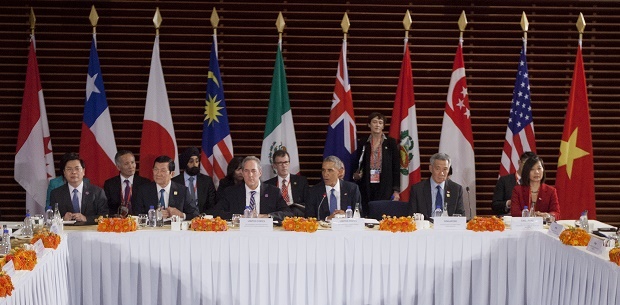
In this Nov. 10, 2014 file photo, U.S. President Barack Obama, center, speaks during his meeting with leaders of the Trans-Pacific Partnership countries, in Beijing. Sitting with Obama are, from left, Vietnam Minister of Industry and Trade Vu Hoy Hoang, Vietnam Prime Minister Nguyen Tan Dung, U.S. Trade Representative Ambassador Mike Froman, Singapore Prime Minister Lee Hsien Loong, and Singapore Sec. of Ministry of Trade and Industry Ow Foong Pheng. The United States and 11 other Pacific Rim countries on Monday, Oct. 5, 2015, agreed to the Trans-Pacific Partnership, an ambitious and controversial trade pact that cuts trade barriers, sets labor and environmental standards and protects multinational corporations’ intellectual property. AP Photo
Washington, United States—Hillary Clinton, who regularly promoted White House efforts to complete a huge trade accord with Pacific Rim countries while she was US secretary of state, came out Wednesday against the deal.
The apparent flip in position—which Republicans wasted no time in branding “painful waffling”—represents yet another Clinton break from President Barack Obama as she gears up for an intense 2016 campaign battle for the White House.
READ: United States, 11 Pacific Rim countries reach trade deal
The Trans-Pacific Partnership (TPP) signed Monday between 12 nations would be the largest regional trade pact ever, encompassing 40 percent of the global economy and marking one of Obama’s key diplomatic and economic achievements.
But Clinton, frontrunner for the Democratic presidential nomination, said that given what she knows about the deal it falls short of her “high bar” for creating American jobs, raising wages and advancing US national security.
“As of today, I am not in favor of what I have learned about it,” she told public broadcaster PBS in an interview.
“I don’t believe it’s going to meet the high bar that I have set.”
READ: Pacific trade agreement could cause rift in political camps
As a result of what she called Republican obstruction to needed investment in infrastructure, education and innovation, “America is less competitive than we should be,” she said in a later statement confirming her opposition.
“Workers have fewer protections, the potential positive effects of trade are diminished, and the negative effects are exacerbated,” she said.
“We’re going into this with one arm tied behind our backs.”
A White House official said a Clinton staffer did alert them of her shift in position on the trade deal but the official declined to provide details.
‘Don’t trust her’
The hard-won trade deal aims to set the rules for 21st century trade and investment and press China, not among the 12, to shape its behavior in commerce, investment and business regulation to TPP standards.
US lawmakers have cautiously welcomed the accord, but it faces intense scrutiny in Congress, which will vote on its ratification in 2016.
Clinton said she was “worried” that currency manipulation provisions were not included in the accord.
“We’ve lost American jobs to the manipulations that countries, particularly in Asia, have engaged in,” she said.
Over time, TPP reduces thousands of small and large tariff and non-tariff barriers on trade between the group, from Japanese auto parts to the US market, Australian drugs to Peru, US rice to Japan and New Zealand cheese to Canada.
Clinton’s position puts her on the same side as Democratic nomination rivals Bernie Sanders and Martin O’Malley, ahead of their first Democratic primary debate next Tuesday.
The Republican National Committee pounced on Clinton’s “flip flop,” recalling how she helped negotiate the accord as top diplomat.
“Hillary Clinton’s painful waffling on TPP has been a case study in political expediency and is precisely why an overwhelming majority of Americans dont trust her,” RNC chairman Reince Priebus said.
Last week Clinton called for the creation of a no-fly zone in Syria, something the White House has resisted, and in August she opposed Obama’s decision to allow Arctic drilling.
Last month she announced she was against construction of the Keystone XL pipeline that would send Canadian crude to US refineries, a project that remains under consideration by the White House.